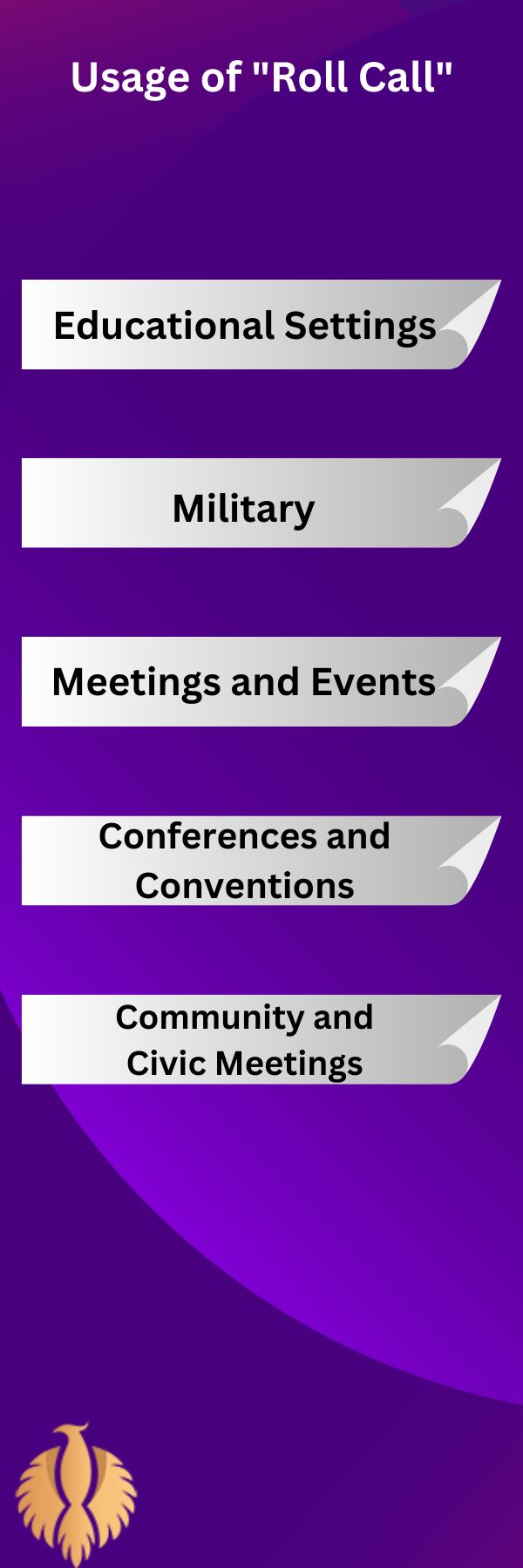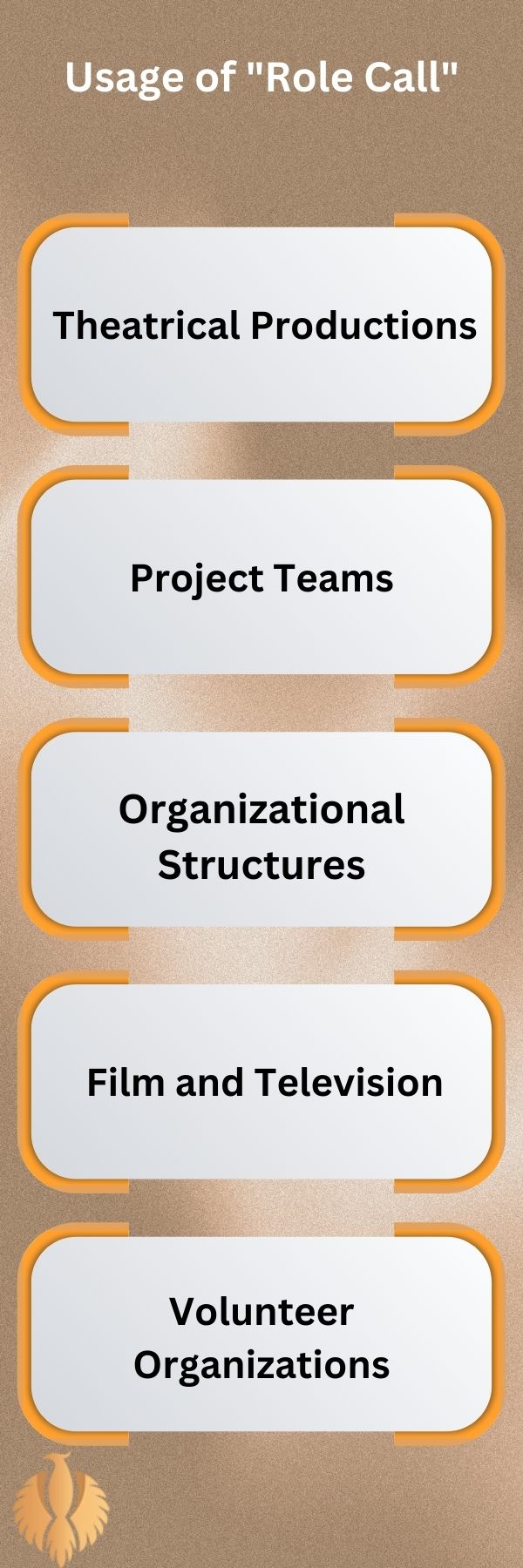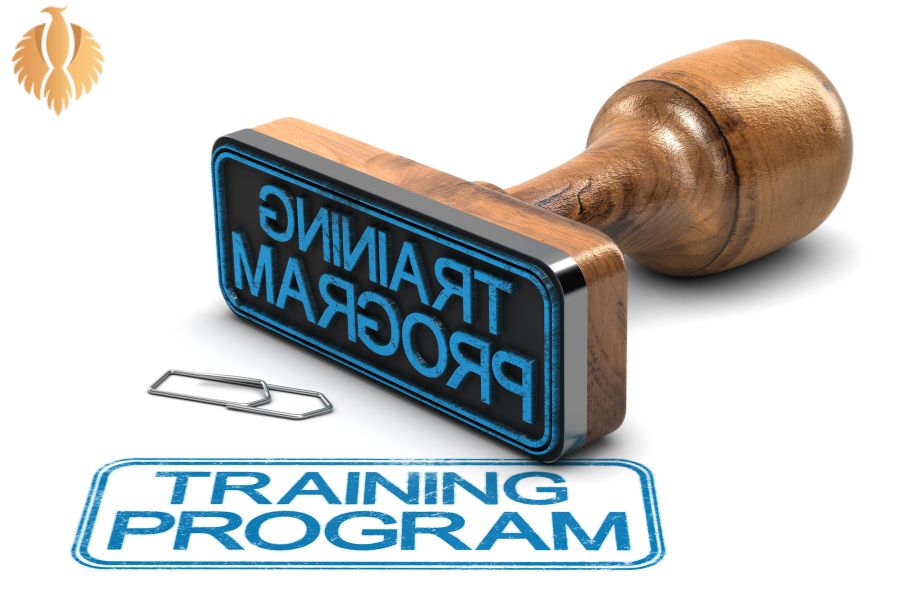When I first encountered the phrases “role call” and “roll call,” I was puzzled by their identical pronunciation but different meanings. Let’s clarify the distinction: “roll call” is the correct term, referring to the practice of reading out names to check attendance.
“Roll call” is commonly used in classrooms or meetings. For example, a teacher might say, “Let’s start with a roll call to see who is here today.” This term originates from the historical use of a roll of parchment for listing names. Conversely, “role call” is a frequent misspelling, with “role” referring to the function or part someone plays, such as an actor’s role in a play.

Understanding these distinctions not only clarifies their proper usage but also deepens one’s appreciation for the nuances of the English language.
You might also enjoy: Top 100 Commonly Used Verbs That Start With D [2024]
Proper Spelling and Usage
- Roll Call: Correct term; refers to reading out names to check attendance.
- Role Call: Incorrect spelling; “role” refers to someone’s function or part.
Examples of Usage
- Correct Usage: “During the morning assembly, the teacher took a roll call to ensure all students were present.”
- Incorrect Usage: “The director conducted a role call to verify the actors’ presence on set.” (The correct term here should be “roll call.”)
Importance of Accurate Spelling
Misusing these terms can cause confusion and disrupt communication. By using the correct term, you ensure clarity and maintain the integrity of your message. “Roll call” should always be used when referring to checking attendance, and “role” is reserved for discussing functions, parts, or positions.
Understanding “Roll Call”
“Roll call” is the term most people are familiar with, especially in settings like schools, military units, and meetings.
It refers to the act of reading out a list of names to check who is present. The origin of the term dates back to the practice of calling out names from a “roll” or list, hence “roll call.”
You might also enjoy:Looking Forward To Seeing You: Grammar + Examples[2025]
Usage of “Roll Call”

- Educational Settings: In schools, “roll call” is a daily ritual. Teachers call out students’ names to mark attendance. This practice ensures that everyone who is supposed to be in class is accounted for.
- Example: Every morning, Mr. Thompson conducts a roll call to ensure all his students are present before starting the lesson.
- Military: In the military, “roll call” is critical for maintaining discipline and accountability. Soldiers’ names are called out to ensure everyone is present or to note absences.
- Example: During morning assembly, Sergeant Harris performs a roll call to verify the presence of all platoon members.
- Meetings and Events: In various organizational meetings, “roll call” helps in recording attendance and ensuring that the quorum is met.
- Example: Before the board meeting began, the secretary conducted a roll call to confirm that all directors were present.
- Conferences and Conventions: Large gatherings, such as academic conferences or conventions, also use “roll call” to ensure that all registered participants or representatives are in attendance.
- Example: At the annual educators’ conference, a roll call was taken at the start of each session to track attendance.
- Community and Civic Meetings: Local government councils or community groups use “roll call” to record the presence of members, ensuring transparency and accountability.
- Example: At the town hall meeting, the moderator performed a roll call to verify which council members were present.
You might also enjoy:Emersion Vs Immersion: Meaning, Differences, and Examples
Understanding “Role Call”
“Role call,” on the other hand, is far less common and often mistaken for “roll call.” It pertains to the identification or listing of roles within a group or organization.
This could be used in a context where it’s essential to delineate responsibilities or parts assigned to individuals.
Usage of “Role Call”

1.Theatrical Productions: In theater, “role call” can refer to announcing the roles that actors will play in a production.
-
- Example: At the first rehearsal, the director made a role call, assigning each actor their respective characters.
2.Project Teams: In project management, a “role call” might be used to specify who is responsible for what tasks.
-
- Example: During the kickoff meeting, the project manager did a role call to clarify the responsibilities of each team member.

3.Organizational Structures: In large organizations, a “role call” can help in defining and reminding employees of their roles and duties.
-
- Example: The CEO conducted a role call to ensure that all department heads were clear about their specific roles in the new strategic initiative.
4.Film and Television: Similar to theater, film and television productions use “role call” to assign parts to actors and ensure everyone knows their responsibilities.
-
- Example: Before filming began, the director held a role call to confirm each actor’s part and responsibilities on set.
5.Volunteer Organizations: In volunteer groups, “role call” can be used to assign tasks and clarify roles for events or projects.
-
- Example: At the charity event planning meeting, the organizer did a role call to assign specific duties to the volunteers.
You Might Also Enjoy: Top 60 Most Common Simple Sentences In English
Spelling and Common Mistakes
The similarity in pronunciation between “roll call” and “role call” often leads to confusion and incorrect usage. It’s crucial to understand the context to choose the appropriate term.
- Roll Call: Always use this spelling when referring to the act of calling out names from a list to check attendance.
- Common Mistake: Using “role call” instead of “roll call” in the context of attendance.
- Correct Example: The teacher took a roll call at the beginning of the class.
- Role Call: Use this spelling when referring to the identification or assignment of roles.
- Common Mistake: Using “roll call” instead of “role call” when talking about assigning roles or parts.
- Correct Example: The director did a role call to assign characters for the play.
Practical Examples
To further illustrate the differences and correct usages, here are some practical examples:
- Roll Call:
- In a Classroom: “Ms. Smith always does a roll call to ensure all students are present.”
- In a Corporate Meeting: “Before starting the agenda, the chairman performed a roll call to confirm the presence of all members.”
- Role Call:
- In a Theater: “After the auditions, the director made a role call to assign parts to the actors.”
- In a Corporate Structure: “During the restructuring meeting, a role call was conducted to redefine each manager’s duties.”
- In Film Production: “The producer initiated a role call to allocate tasks for the filming schedule.”
The Importance of Correct Usage
Understanding the difference between “roll call” and “role call” is essential not just for grammatical accuracy but also for clear communication. Correct usage ensures that your message is conveyed accurately, preventing misunderstandings and confusion.
For instance, if a project manager says they will do a “roll call” when they mean “role call,” team members might expect an attendance check rather than a clarification of duties. Miscommunications in professional settings can lead to significant inefficiencies and potential errors.
- Consequences of Miscommunication
Miscommunication can have far-reaching impacts, especially in professional and academic environments. For example, during a critical project phase, clarity about each team member’s role is vital. Mislabeling a “role call” as a “roll call” could mean that key discussions about responsibilities and expectations might be missed, potentially derailing project timelines and outcomes.
- Enhancing Communication
To avoid such pitfalls, it’s important to enhance communication by using the correct terms. Here are some steps to ensure clarity:
- Proofreading
Proofreading your written communication can catch errors before they cause confusion. Spending a few extra minutes to review your work can make a big difference in how your message is received.

- Context Awareness
Being aware of the context in which you’re using these terms can help you choose the right one. For instance, “roll call” should be used when checking attendance, and “role call” when discussing duties and responsibilities.
- Feedback
Encourage feedback from peers and team members to identify any recurring issues with usage. Constructive feedback helps you improve and maintain clear communication.
- The Role of Education
Education plays a critical role in ensuring the correct usage of terms. Understanding the etymology and proper application of words like “roll call” and “role call” is foundational to proficient language use. Investing time in learning can prevent common mistakes and improve overall communication skills.
Tips for Remembering the Difference
- Association with Context: Associate “roll call” with the image of a teacher or a military officer calling out names from a list. Link “role call” with the image of a director or manager assigning roles.
- Mnemonic Device: Remember that “roll call” involves a “roll” (a list), while “role call” involves “roles” (responsibilities or parts).
- Practice with Examples: Regularly practice using both terms in sentences to reinforce their correct contexts and meanings.
To aid in this, here are a few mnemonic exercises:
- Visualize a School Setting: Picture a teacher with a clipboard calling out names — this is “roll call.”
- Imagine a Theater Stage: Visualize a director announcing character assignments — this is “role call.”
- Write Sentences: Craft sentences using both terms correctly to reinforce their usage in your mind.
Personal Reflections
Reflecting on my own experiences, I recall an instance during my college days where our professor mistakenly used “role call” when intending to take attendance.
It led to a humorous situation where students began stating their roles in the class project rather than simply saying “present.”
This mix-up was a clear demonstration of how important it is to use the correct term to convey the intended message. ✉️
On another occasion, during a theater production I was involved in, the director used “roll call” instead of “role call” when assigning parts to the cast. This caused a bit of confusion until we all realized what he meant.
These experiences underscore the significance of precision in language, especially in professional and formal settings.
Additionally, in a corporate setting, I once witnessed a project manager announce that a “roll call” would be conducted to assign tasks for an upcoming project.
This led to some puzzled looks and a bit of a delay, as team members were unsure whether they needed to confirm their presence or discuss their responsibilities.
This small but impactful mistake emphasized to me the importance of using the correct terminology to avoid confusion and maintain efficiency.
Exploring Further Applications
To delve even deeper, let’s explore more specific scenarios where these terms are used and the potential consequences of their misuse.
Academic Conferences
Academic conferences often involve numerous sessions with various speakers and participants.
Ensuring that everyone is present for their scheduled talks is crucial for the smooth running of the event. A “roll call” here is vital to verify attendance.
- Example: “Dr. Sanchez conducted a roll call at the start of the symposium to ensure all speakers were present and ready for their presentations.”
However, during the planning stages, a “role call” might be used to assign organizational responsibilities to different committee members.
Corporate Training Programs

In corporate training programs, attendance is often mandatory and monitored through a “roll call.” This ensures that all employees who are required to attend are present and participating in the training sessions.
- Example: “At the start of the safety training program, the facilitator performed a roll call to ensure all employees from the warehouse team were present.”
On the other hand, the planning phase of the training program might involve a “role call” to assign various tasks such as content development, presentation, and follow-up evaluations to different members of the training team.
You might also enjoy:How Are You Fairing or Faring? Differences + Examples
Emergency Preparedness Drills
In organizations, schools, or community groups that conduct emergency preparedness drills, taking a “roll call” is crucial for ensuring everyone is accounted for during and after the drill.
- Example: “After the fire drill, the principal took a roll call to make sure all students and staff were safely evacuated and accounted for.”
Similarly, a “role call” may be used to designate specific responsibilities to individuals in the event of an actual emergency, such as evacuation leaders, first aid responders, and communication coordinators.
- Example: “In the emergency response plan meeting, the coordinator performed a role call to assign roles like floor warden and emergency contact liaison to staff members.”
The Evolution of Terms in Digital Contexts
In today’s digital age, the concepts of “roll call” and “role call” have also evolved. With virtual meetings, online classrooms, and remote work becoming more prevalent, the application of these terms has expanded into the digital realm.
Virtual Meetings and Webinars
In virtual meetings or webinars, a “roll call” can still be relevant to ensure all participants are present. This might involve calling out names or using digital attendance tools.
For webinars and online training sessions, a “role call” can be used to assign specific tasks such as moderating chat discussions, handling technical issues, or presenting certain sections of the content.
- Example: “Before the webinar started, the organizer did a role call to assign roles like chat moderator and Q&A session facilitator to the team members.”
You might also enjoy:Too Cute Meaning Vs To Cute (To Vs Too) + Examples
Online Classrooms

In online educational settings, teachers and instructors might take a “roll call” to verify student attendance in virtual classes, ensuring all students are logged in and participating.
- Example: “Professor Lee started the online lecture with a roll call, checking off each student’s name as they joined the virtual classroom.” ️
During collaborative online projects, a “role call” can help clarify each student’s responsibilities, ensuring everyone knows their tasks and contributions to the project.
The Importance of Clear Communication ☎️
Clear communication is fundamental in both professional and educational settings. The misuse of “roll call” and “role call” can lead to misunderstandings, delays, and even conflicts.
By ensuring the correct use of these terms, we can promote clarity and efficiency.
You might also enjoy:What Kind of Vs What Kinds of – Differences + Examples [2025]
Mitigating Confusion
Miscommunication can be particularly problematic in high-stakes environments. For instance, in emergency response situations, confusion over roles and attendance can have serious consequences.
Ensuring that everyone understands whether an attendance check (roll call) or a task assignment (role call) is being conducted is crucial.
- Example: “During the emergency drill debrief, the coordinator emphasized the importance of clear communication, noting that a mix-up between roll call and role call could lead to confusion in a real emergency.”
Enhancing Team Collaboration
In team settings, whether in corporate projects or educational group work, clearly distinguishing between attendance and role assignments helps in setting expectations and responsibilities. This enhances collaboration and accountability among team members.
Broader Linguistic Insights
The distinction between “roll call” and “role call” also offers broader insights into the nuances of the English language. Homophones, or words that sound the same but have different meanings, can be challenging even for native speakers.
This highlights the importance of context in understanding and using language accurately.
The Role of Context
Context is key in distinguishing between homophones. While “roll call” and “role call” sound identical, their meanings become clear when placed in the appropriate context. This understanding is vital for effective communication and avoids potential misunderstandings.
Final Reflections ✍️

Reflecting on the journey of understanding “roll call” versus “role call,” it’s clear that these terms, while seemingly simple, play crucial roles in various contexts.
Their correct usage is essential for clarity, efficiency, and effective communication in both professional and educational settings.
My own experiences with these terms have underscored the importance of precision in language.
From humorous mix-ups in college to serious misunderstandings in professional environments, the journey of learning and distinguishing between “roll call” and “role call” has been enlightening.
Practical Exercises for Mastery
To help others master the correct usage of “roll call” and “role call,” here are some practical exercises:
- Contextual Sentences: Write ten sentences using “roll call” and ten sentences using “role call” in their appropriate contexts. This practice will reinforce the correct usage and help solidify understanding.
- Role-Playing Scenarios: Create role-playing scenarios where participants must use “roll call” and “role call” correctly. For example, one scenario could be a classroom setting where a teacher takes attendance, and another could be a theater rehearsal where roles are assigned.
- Quizzes and Tests: Develop quizzes that test the ability to choose the correct term based on given scenarios. This can be a fun and interactive way to ensure mastery of the terms.
- Group Discussions: Facilitate group discussions where participants share their own experiences with “roll call” and “role call.” Discussing real-life examples can help deepen understanding and highlight the importance of using the correct term.
Conclusion
In conclusion, although the terms “roll call” and “role call” sound similar, they have different meanings. “Roll call” refers to the practice of calling names from a list in order to verify attendance; it is frequently employed in meetings, schools, and the military.
The term “role call,” though less frequently used, describes the process of determining or allocating roles within a team or organization. It is frequently observed in project teams, corporate hierarchies, and theatrical plays.
For effective communication, these terms must be used and spelled correctly.
One can improve their linguistic accuracy and steer clear of typical blunders by practicing the usage of each term and connecting it to its appropriate context.
My comprehension of these phrases has been fascinating, and I hope that by sharing my knowledge, others will be better able to confidently and clearly navigate the subtle differences between “roll call” and “role call.”
Learning these phrases guarantees clear and efficient communication in all contexts—business, school, and casual talks—which eventually promotes improved cooperation and comprehension.

Hi, welcome to my blog! My name is Omid and I am thrilled to have you here! I am an English language teacher with 12 years of experience and hold multiple international certifications (TESOL, IELTS, TOEFL, PTE, CELTA). Additionally, I hold a PhD in Applied Linguistics with a specialization in Teaching English as a Second Language (TESL), which fuels my passion for teaching English and assisting others in mastering the language. To me, nothing is more rewarding than helping individuals enhance their English language abilities through various methods. So, let’s embark on this journey of learning English together.




